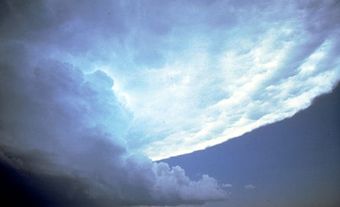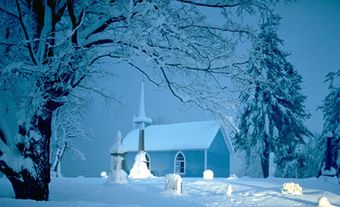Chinooks are warm, dry, gusty, westerly winds that blow down from the Rocky Mountains into the mountains' eastern slopes and the western prairies. The Chinook belongs to a family of winds experienced in many parts of the world where long mountain chains lie more or less at right angles to the prevailing wind. Examples include the Foehn in Europe, the Zonda in Argentina and the Berg in South Africa. In Canada, the Chinook belt lies almost exclusively within southern and central Alberta.
Frequency and Intensity
Chinook winds occur in every season but are more distinctive and numerous in the winter when the unseasonable warming it brings differentiates it from the normal cold winter weather. In southwestern Alberta, one in 3 winter days is a chinook day; its frequency drops to one in 5 in the northeast. The maximum daily temperature anomaly associated with the wind ranges from +13°C in the northwest to +25°C in the southeast. The temperature rise at the onset of the event is abrupt and steep; an increase of 27°C in 2 minutes has been observed.
Causes
The warmth of the chinook is derived primarily from 2 non-mutually exclusive sources. Firstly, the replacement of arctic air (the mean temperature at Calgary's elevation is -24°C) by maritime air (-2°C) improves surface temperatures. Secondly, if the downslope flow occurs following a moisture loss through precipitation on the windward side of the mountain, the heat used to change the water into vapour (latent heat) is returned to the air parcel and warms it. The downslope flow leeward of the mountain warms the wind further, reducing its relative humidity, sometimes down to 25% or less. Wind speed ranges from 16 km/h to 60 km/h, gusting to 100 km/h.
Effects
The Chinook melts snow, dries soil, desiccates vegetation, and contributes to soil erosion. Most people appreciate the Chinook because it is a pleasant break from the region's frigid winter temperatures. However, a significant minority complain of discomforts ranging from headaches and earaches to depression and attempted suicide.

 Share on Facebook
Share on Facebook Share on X
Share on X Share by Email
Share by Email Share on Google Classroom
Share on Google Classroom




